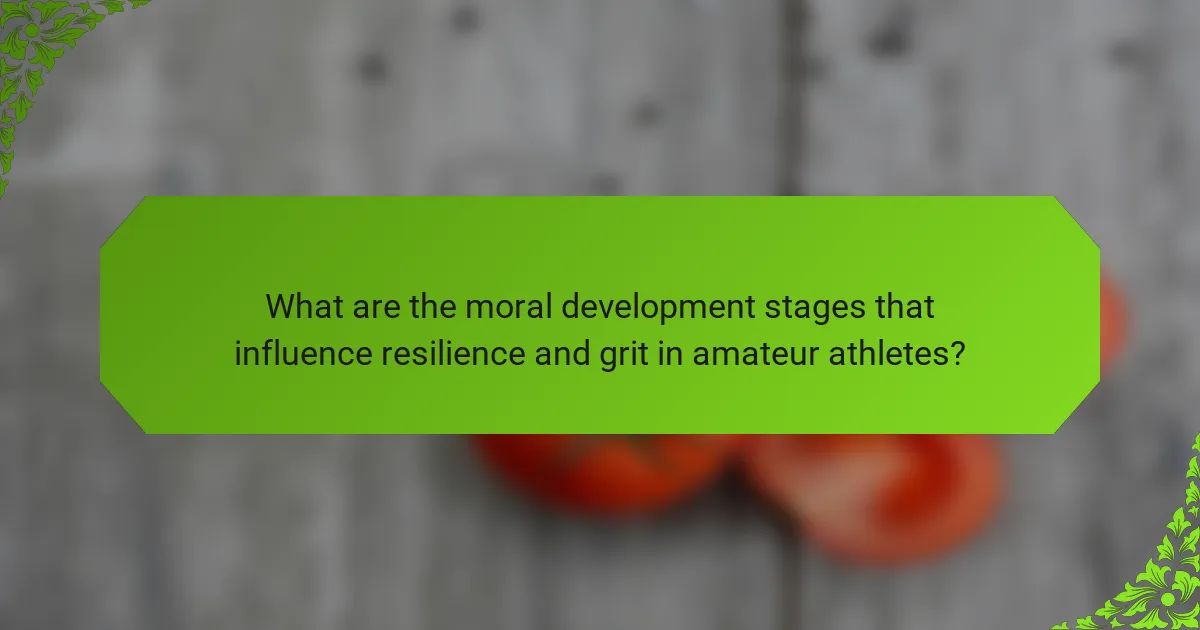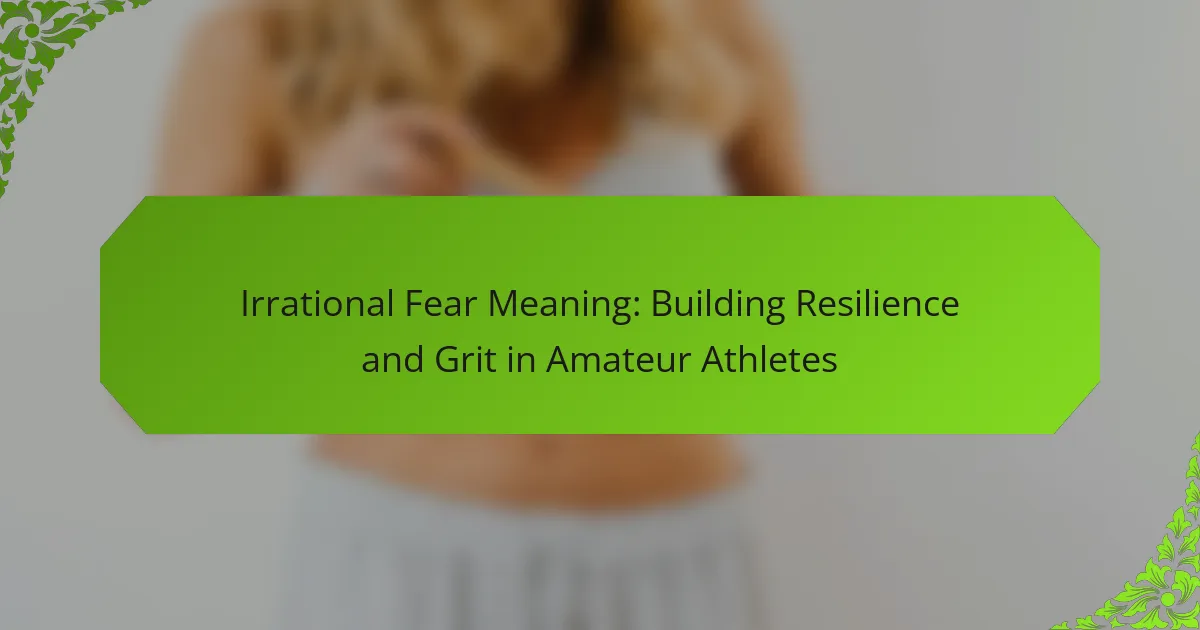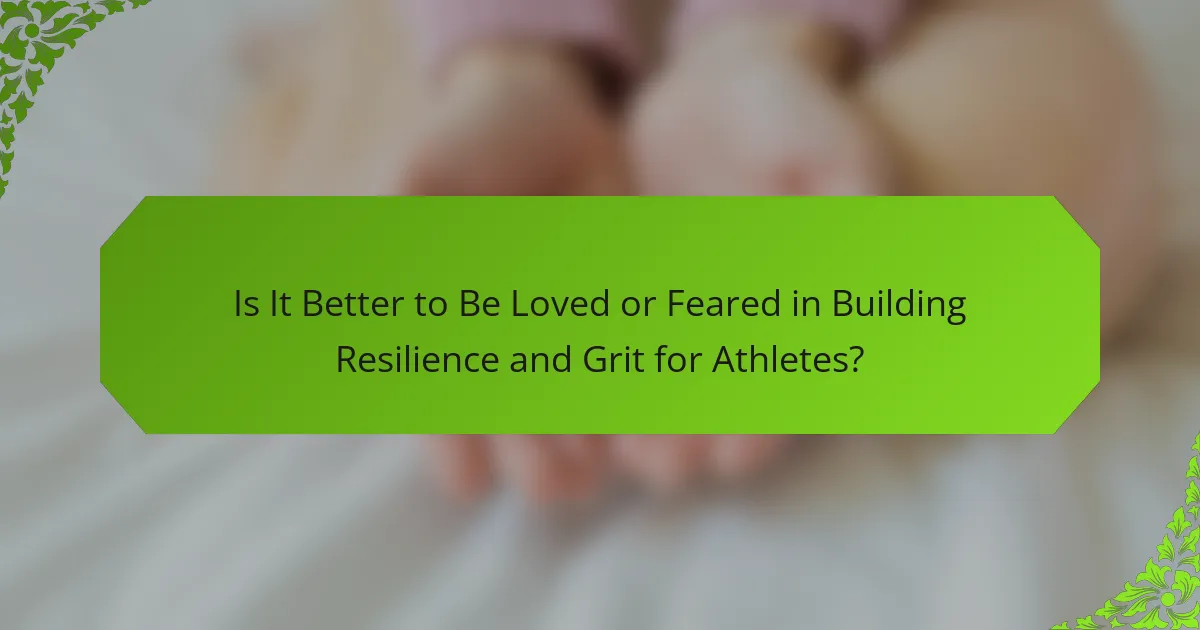Moral development stages play a crucial role in building resilience and grit for amateur athletes. These stages include obedience and punishment orientation, individualism and exchange, interpersonal relationships, and social contract and individual rights. Each stage fosters essential qualities such as perseverance, ethical decision-making, and teamwork. Understanding these stages equips athletes to navigate challenges and enhance their performance in sports.

What are the moral development stages that influence resilience and grit in amateur athletes?
Moral development stages significantly influence resilience and grit in amateur athletes. These stages foster essential qualities such as perseverance and ethical decision-making, which are crucial for overcoming challenges in sports.
The first stage, obedience and punishment orientation, encourages athletes to follow rules to avoid negative consequences. In the next stage, individualism and exchange, athletes learn the value of personal goals and the importance of mutual respect among teammates.
As athletes progress to the third stage, interpersonal relationships, they develop empathy and understand the significance of teamwork. The final stage, social contract and individual rights, promotes a sense of fairness and justice, empowering athletes to advocate for themselves and others.
These moral development stages collectively enhance resilience and grit, equipping amateur athletes to face adversity with determination and integrity.
How do these stages relate to athletic performance?
Moral development stages enhance athletic performance by fostering resilience and grit. These stages encourage athletes to navigate challenges, develop self-discipline, and maintain motivation. Athletes with strong moral foundations exhibit greater perseverance during setbacks, leading to improved outcomes. Resilience built through these stages translates to better focus and determination in competitive environments.
What role does self-awareness play in moral development?
Self-awareness is crucial in moral development as it fosters introspection and ethical reasoning. It enables amateur athletes to recognize their values and the impact of their actions. This understanding builds resilience and grit, essential for overcoming challenges in sports. Self-aware athletes are more likely to engage in ethical decision-making, enhancing their overall moral framework. This process contributes to their success by promoting accountability and integrity in their athletic pursuits.
How can athletes enhance their self-awareness?
Athletes can enhance their self-awareness through reflective practices, feedback, and mindfulness. Engaging in regular self-reflection helps athletes understand their strengths and weaknesses, promoting personal growth. Seeking feedback from coaches and peers provides external perspectives, reinforcing self-assessment. Mindfulness techniques, such as meditation, improve focus and emotional regulation, essential for developing resilience and grit. These methods collectively foster a deeper understanding of one’s motivations and reactions, crucial for amateur athlete success.
What are the universal attributes of resilience and grit?
Resilience and grit are characterized by perseverance, adaptability, and a growth mindset. These universal attributes enable amateur athletes to overcome challenges and maintain focus on their goals. Perseverance reflects the commitment to continue despite setbacks. Adaptability allows for adjustments in strategies when faced with obstacles. A growth mindset fosters continuous learning and improvement. Together, these attributes form a foundation for success in sports and personal development.
What are the key characteristics of resilient amateur athletes?
Resilient amateur athletes exhibit perseverance, adaptability, and a strong sense of purpose. These characteristics enable them to overcome challenges and maintain motivation.
Perseverance allows athletes to persist through setbacks, while adaptability helps them adjust strategies and approaches as needed. A strong sense of purpose drives their commitment to training and competition, fostering grit essential for success.
Research indicates that these traits are developed through experiences and moral development stages, reinforcing resilience. Athletes who cultivate these qualities often achieve higher levels of performance and personal growth.
How does grit manifest in an athlete’s journey?
Grit manifests in an athlete’s journey through perseverance, commitment, and the ability to overcome challenges. Athletes demonstrate grit by maintaining focus on long-term goals despite setbacks. This resilience is often built through experiences of failure and learning from them. For instance, athletes who face injuries often develop a stronger mental fortitude, enabling them to return to their sport with renewed determination. The unique attribute of grit is its correlation with success; athletes exhibiting high levels of grit tend to achieve better outcomes in competitions.
What unique practices can foster resilience and grit?
Practices fostering resilience and grit include goal setting, positive self-talk, and embracing challenges. Goal setting provides clear objectives, enhancing motivation. Positive self-talk reinforces confidence, while embracing challenges builds adaptability. These strategies cultivate a growth mindset, essential for amateur athlete success.
How can goal-setting enhance resilience?
Goal-setting enhances resilience by providing clear objectives that motivate athletes to overcome challenges. It fosters a sense of purpose, encouraging persistence in the face of setbacks. By tracking progress, athletes can celebrate small victories, reinforcing their grit. Effective goal-setting also helps in building mental toughness, as athletes learn to adapt strategies and remain focused on long-term success.
What specific training techniques build grit?
Specific training techniques that build grit include goal-setting, mental toughness exercises, and consistent practice routines. Goal-setting helps athletes focus on achievable milestones, fostering a sense of purpose. Mental toughness exercises, such as visualization and stress management, enhance resilience against challenges. Consistent practice routines instill discipline and perseverance, essential for developing grit. These techniques collectively contribute to an athlete’s success by promoting a growth mindset and the ability to overcome obstacles.
What rare attributes contribute to exceptional resilience?
Exceptional resilience in amateur athletes is influenced by rare attributes such as adaptability, emotional intelligence, and intrinsic motivation. Adaptability allows athletes to adjust to changing circumstances and overcome challenges effectively. Emotional intelligence enhances their ability to manage stress and maintain focus under pressure. Intrinsic motivation drives sustained effort and commitment, fostering grit essential for long-term success. These attributes contribute significantly to an athlete’s ability to bounce back from setbacks and maintain performance.
How can mental toughness be developed in amateur athletes?
Mental toughness can be developed in amateur athletes through structured training and mental conditioning techniques. Focus on goal setting, visualization, and coping strategies to enhance resilience and grit.
1. Set specific, measurable goals to foster a sense of achievement.
2. Practice visualization to mentally rehearse performance scenarios.
3. Employ coping strategies to manage stress and setbacks.
4. Encourage a growth mindset to embrace challenges and learn from failures.
These methods build a strong foundation for mental toughness, essential for athletic success.
What are the uncommon strategies for overcoming setbacks?
Uncommon strategies for overcoming setbacks include fostering a growth mindset, employing visualization techniques, and creating a support network. These approaches enhance resilience and grit, essential for amateur athlete success.
Fostering a growth mindset allows athletes to view challenges as opportunities for learning rather than failures. Visualization techniques help in mentally rehearsing success, building confidence. A strong support network provides emotional encouragement and practical advice, reinforcing perseverance.
Incorporating these strategies can lead to improved performance and a more resilient approach to setbacks in sports.

How can amateur athletes apply moral development stages to improve their grit?
Amateur athletes can enhance their grit by applying moral development stages, fostering resilience and mental toughness. By recognizing and progressing through these stages, athletes learn to navigate challenges, make ethical decisions, and cultivate perseverance.
The first stage, obedience and punishment orientation, helps athletes understand the consequences of their actions. They learn to respect rules and authority, which builds a foundation for consistency in training.
The next stage, individualism and exchange, encourages athletes to set personal goals and appreciate the value of hard work. This self-awareness fosters intrinsic motivation, essential for developing grit.
In the third stage, mutual interpersonal expectations, athletes begin to understand teamwork and the importance of supporting peers. This social aspect reinforces commitment and accountability, critical components of resilience.
Finally, the stage of social contract and individual rights emphasizes the importance of ethical behavior and personal integrity. Athletes who embody these values are more likely to persist through adversity, ultimately enhancing their grit and overall performance.
What actionable tips can enhance resilience in training?
To enhance resilience in training, amateur athletes should adopt specific strategies. Focus on setting realistic goals, maintaining a positive mindset, and embracing challenges as opportunities for growth. Regularly reflect on progress to cultivate self-awareness and adapt training methods accordingly. Building a supportive network with coaches and peers can also provide essential encouragement during difficult times.
What common mistakes should athletes avoid in their development?
Athletes should avoid common mistakes that hinder their moral development and resilience. Key errors include neglecting mental training, underestimating the importance of teamwork, and failing to set realistic goals. Prioritizing physical skills over character development can lead to burnout and poor performance. Additionally, ignoring feedback from coaches and peers can stunt growth and self-awareness. Emphasizing grit and perseverance while learning from setbacks fosters a stronger athlete mentality.
What expert insights can guide athletes in building resilience and grit?
Expert insights for athletes emphasize the importance of moral development stages in fostering resilience and grit. These stages guide athletes in understanding values, enhancing decision-making, and building mental toughness. Fostering a growth mindset enables athletes to embrace challenges and learn from failures. Additionally, mentorship and supportive environments contribute significantly to developing resilience. Athletes who practice self-reflection can identify their strengths and weaknesses, leading to improved performance and grit. Ultimately, these insights create a robust foundation for amateur athletes striving for success.



